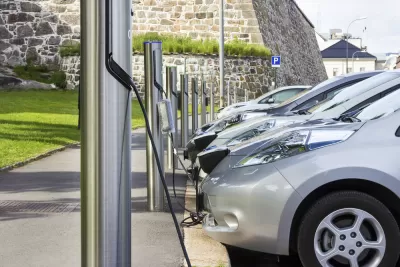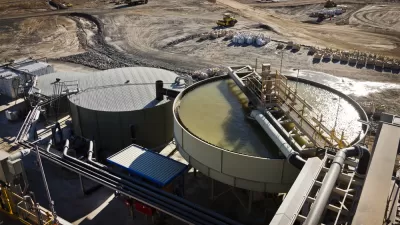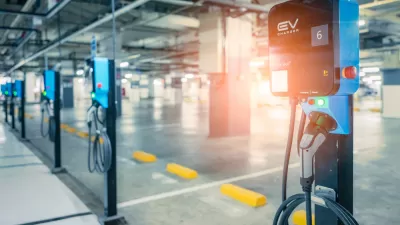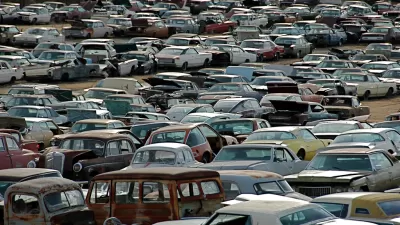Mining jobs needed to produce the metals for processing into battery parts used to build electric vehicles in America will not be developed in the U.S. but in Australia, Brazil and Canada, mainly to avoid battles with environmentalists.

Hunnicutt and Scheyder write that the main reason that the Biden administration changed its sourcing plans for the raw materials needed to process electric vehicle batteries was "to ensure the administration's EV aspirations are not imperilled as domestic mines face road blocks, the sources said, both from environmentalists and even some Democrats."
The reporters add that "the U.S. Department of Energy has awarded grants to help old coal mines find ways to produce rare earths. U.S. officials have also funded MP Materials Corp (MP.N), which owns the country's only rare earths mine, though it relies on Chinese processors."
But the bulk of Biden's approach is designed to sidestep battles with environmentalists and save capital for other fights, according to one administration source.
Reuters notes that the impact will be felt mostly by "smaller, U.S.-focused companies."
"We can no longer push the production of the products we want to places we cannot see and to people we will never meet," said Mckinsey Lyon of Perpetua Resources Corp (PPTA.TO), which is trying to develop Idaho's Stibnite mine to produce gold and antimony used to make EV battery alloys.
Partisan divide on mining
Reuters captured the opposing partisan viewpoints on mining expressed by Reps. Betty McCollum (DFL-Minn.) and Lauren Boebert (R-Colo.)
"It rings hollow when I hear everyone use this as a national defense argument, that we have to build new mines to have a greener economy," said McCollum, who has introduced legislation that would permanently block Antofagasta Plc's (ANTO.L) proposed Twin Metals copper mine in Minnesota.
"These 'not-in-my-backyard' extremists have made clear they want to lock up our land and prevent the mining of minerals," told a House Natural Resources Committee forum held the same day as Biden's Michigan visit [where he drove Ford's electric F-150 pickup truck].
Fox News anchor Dana Perino discussed the Reuters' report with guest Scott Lincicome, a senior fellow in economic studies with the Cato Institute, during America's Newsroom on May 26 and referenced the partisan controversy in a question as to why environmentalists would oppose domestic mining for metals needed for EV batteries.
"If the environmentalists are going to complain about it...They don't care that the resources would be stripped from other countries, just here in our country where we, I think, probably do it cleaner and better, and that provide jobs here? I can see why the miners are irked."
Lincicome responded that what was at stake was "the regulatory apparatus allowing people to gum up mining permitting operations, to sue to block these operations and thus giving [domestic] miners a disadvantage in the global market."
Contributor's comment: In reviewing past posts related to the electric vehicle investment component of the American Jobs Plan, it's interesting to see that the Obama administration also invested in promoting the domestic production of electric vehicles, sometimes with negative results, as the post from 2012 listed below reminds us.
Related in Planetizen:
-
Cost of Electric Vehicles Will Soon Rival Gasoline Counterparts, August 4, 2020
-
Demand for Lithium Drops as Global Electric Vehicle Sales Slump, September 7, 2019
-
Breaking News: $5 Billion Tesla Battery 'Gigafactory' Headed to Nevada, September 4, 2014
FULL STORY: Exclusive: Biden looks abroad for electric vehicle metals, in blow to U.S. miners

Planetizen Federal Action Tracker
A weekly monitor of how Trump’s orders and actions are impacting planners and planning in America.

Map: Where Senate Republicans Want to Sell Your Public Lands
For public land advocates, the Senate Republicans’ proposal to sell millions of acres of public land in the West is “the biggest fight of their careers.”

Restaurant Patios Were a Pandemic Win — Why Were They so Hard to Keep?
Social distancing requirements and changes in travel patterns prompted cities to pilot new uses for street and sidewalk space. Then it got complicated.

Platform Pilsner: Vancouver Transit Agency Releases... a Beer?
TransLink will receive a portion of every sale of the four-pack.

Toronto Weighs Cheaper Transit, Parking Hikes for Major Events
Special event rates would take effect during large festivals, sports games and concerts to ‘discourage driving, manage congestion and free up space for transit.”

Berlin to Consider Car-Free Zone Larger Than Manhattan
The area bound by the 22-mile Ringbahn would still allow 12 uses of a private automobile per year per person, and several other exemptions.
Urban Design for Planners 1: Software Tools
This six-course series explores essential urban design concepts using open source software and equips planners with the tools they need to participate fully in the urban design process.
Planning for Universal Design
Learn the tools for implementing Universal Design in planning regulations.
Heyer Gruel & Associates PA
JM Goldson LLC
Custer County Colorado
City of Camden Redevelopment Agency
City of Astoria
Transportation Research & Education Center (TREC) at Portland State University
Camden Redevelopment Agency
City of Claremont
Municipality of Princeton (NJ)





























